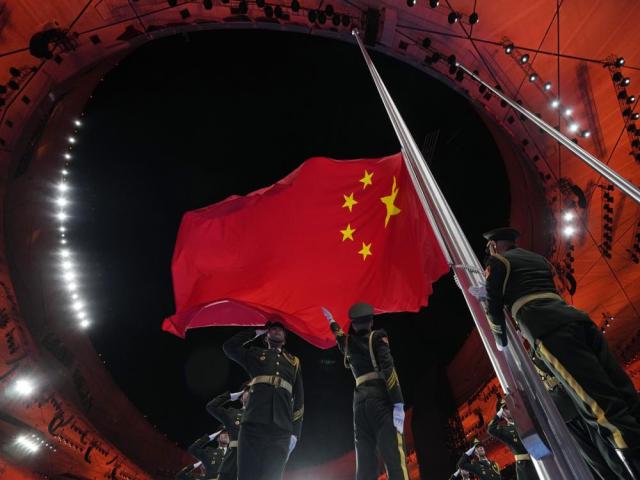In Beijing, Olympic ideals coexist with authoritarian rule

His collar turned up against the cold, the head of the International Olympic Committee looked out over the stadium and spoke of the ideals that had brought together athletes from all over the world.
“In our fragile world, where division, conflict and mistrust are on the rise, we show the world that it is possible to be fierce rivals while at the same time living peacefully and respectfully together,” Thomas Bach, a gold-medalist fencer nearly 40 years ago, said Friday at the Winter Games’ opening ceremony.
The Olympic mission is clear, he said: “Always building bridges, never erecting walls.”
Critics of Bach and the IOC say those ideals are nonsense, and talk of respect and bridge-building is overshadowed by Olympic officials cozying up to some of the world’s most powerful authoritarian rulers. Starting with holding this year’s Games in a country accused of widespread human rights violations.
The IOC knows that Beijing has locked up hundreds of thousands of minority Uyghur Muslims, those critics say, and arrested countless people who dared voice criticism of the government.
The IOC’s “failure to publicly confront Beijing’s serious human rights violations makes a mockery of its own commitments and claims that the Olympics are a ‘force for good,’” Sophie Richardson, China director at Human Rights Watch, said shortly before the Games opened.
Some rights activists are calling these Olympics the “Genocide Games,” and leaders of a string of democratic nations, including the U.S., Great Britain, Australia and Canada, are avoiding the Games, citing either Beijing’s human rights violations or its sweeping coronavirus restrictions.
Meanwhile, Chinese President Xi Jinping is hosting a parade of fellow strongman leaders, including Russia’s Vladimir Putin, who met Friday with Xi before attending the opening ceremony, as well as the leaders of Egypt and Serbia, who were meeting with China’s leader on Saturday.
The Games come at a time when democracy can look like it’s in retreat.
Over the past year there was a military takeover in Myanmar, Beijing’s tightening grip over Hong Kong and a brutal political crackdown in Nicaragua. There are authoritarian rulers from Turkey to the Philippines.
The IOC rarely mentions any of this.
Bach, for his part, has studiously steered around talk of human rights in China. He did say he would meet Peng Shuai, the Chinese tennis star who largely dropped from sight after accusing a former top Communist Party official of sexual assault, then later insisted she’d been misunderstood. Bach said she’d told IOC officials that she “that she can move freely, that she’s spending time with her family and friends.”
He said he’d support Peng if she wants an investigation. “But it’s her life, it’s her allegations,” he added.
Avoiding controversy has long been Bach’s rule.
But on reflection, Asat saw crumbs of encouragement. China has steadfastly rejected international criticism of its crackdown on Uyghurs, treatment that the U.S. government and others have said is tantamount to genocide. China’s hosting of the Games has made many exiled Uyghurs feel that their voices aren’t heard.
But the selection of a relatively unknown athlete to light the flame couldn’t be a coincidence. Asat said, after her initial outrage had subsided, she figured China isn’t as immune to outside criticism as it pretends.
“It obviously cares profoundly about outside criticism. This is why it’s important that we keep criticizing,” she said. “I do feel like Beijing is very much scared that it has lost its international reputation.”
China says the detention centers in the western Xinjiang region were built to fight Islamic extremism. Leaders say the camps provided job training and have since been closed. Uyghurs overseas say their loved ones are still imprisoned.
Some saw the choice of Yilamujiang as a deliberate poke in the eye to critics.
“That was very, very much a deliberate choice,” said Darren Byler, an assistant professor of international studies at Canada’s Simon Fraser University who has written extensively about the camps.
“I think it should be read as China saying we are not backing away from our stance on what we’re doing in Xinjiang and we don’t really care what the world thinks about it,” Byler told The Associated Press by phone.
The Chinese public has been mobilized to support Xinjiang following an international campaign against the use of cotton from the region amid allegations of forced labor.
“I think that this was intended for an international audience primarily but certainly for the domestic audience as well as a sign of defiance and strength,” Byler said.
Officially, there has been little commentary on Yilamujiang’s role, although the Communist Party newspaper Global Times wrote Saturday that her Xinjiang background was “worth noting.”
International Olympic Committee spokesperson Mark Adams said it did not take a torchbearer’s ethnicity into consideration when giving its approval, but added; “I think it was a lovely concept.”
Among the multiple human rights issues overshadowing the Games, Xinjiang by far looms the largest.
Human rights groups have dubbed these the “Genocide Games,” and the U.S. and several other Western democracies have cited rights abuses in staging a diplomatic boycott of the event.
Uyghurs, who are culturally, linguistically and religiously distinct from Han Chinese, have long resented Beijing’s heavy-handed rule and the influx of migrants who have reaped economic benefits in the resource-rich region.
The resentment erupted into a series of violent incidents labeled terrorism by China, leading president and Communist Party leader Xi Jinping to demand a mass crackdown. The network of camps was established around 2017.
Critics and former inmates told of strict discipline and harsh living conditions inside. Other reports spoke of families separated by the authorities, mass surveillance and coercive birth control policies forced on Muslim women.
China dismisses accusations of abuses as “the lie of the century” and says its policies have resulted in an end to separatist violence. Critics say the result has been a traumatized population, cultural dislocation and continuing abuses.
China’s policies in Xinjiang should have elicited a stronger response from the international community, including a total boycott of the Games, said Kamaltürk Yalqun, a Uyghur was one of several students chosen to help carry the Olympic flame ahead of the 2008 Summer Games in Beijing.
“It should be a collective responsibility when such kind of atrocities are happening,” he said. “It’s heartbreaking for me to see such a cold response from people.”
Whether Yilamujiang sees a political role for herself isn’t clear. Her social media posts have focused entirely on her desire to compete successfully.
Born in Xinjiang’s far-northwestern Altay prefecture that borders Kazakhstan, Russia and Mongolia, she was first coached by her father, himself a pioneer in Chinese cross-country skiing. The practice of using felt-lined skis to travel and hunt in the region is believed to date back thousands of years.
In recent years, Yilamujiang has competed extensively abroad and began her Beijing Olympics campaign Saturday.
The fact her parents are both government employees provides the right sort of background to receive the government’s political and financial support required by virtually all elite Chinese athletes.
That, said Byler, “really protects the family.”
Among the Chinese public, information about Xinjiang is derived mainly from government propaganda that emphasizes economic development and social harmony, while dismissing all outside criticism.
At a park just north of the stadium Saturday, Beijing residents told The Associated Press they saw Yilamujiang’s participation as a show of ethnic unity devoid of any political message.
“When I saw two athletes, my first reaction was gender equality,” said Jiang Miya, adding she perceived no real link to the issue of Xinjiang or politics in general.
Another resident, Wang Yang, said the event sent a message of “unity and progress” that shouldn’t be tainted by politics.
“Don’t magnify or politicize this kind of issue,” Wang said. “We should separate sports and politics, enjoy the Olympics wholeheartedly, and talk less about politics.”

In Beijing, Olympic ideals coexist with authoritarian rule
- His collar turned up against the cold, the head of the International Olympic Committee looked out over the stadium and spoke of the ideals

Bali reopens to foreign travelers from all countries
- Direct international flights to Bali have resumed for the first time in two years as Indonesia opens the resort island to foreign

The Unique Benefits a Driver Must Possess
- While were looking at voyaging for example especially serene travel, we cant miss the reliability that directs

Winter storm blows out to sea, but some areas without power
- The winter storm that caused hundreds of thousands of power outages and contributed to hundreds of traffic accidents